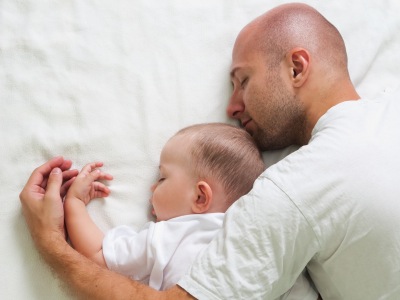It is eight o’clock, and Rebecca A. tucks her daughter Nora in to the family bed. Although her daughter has her own bed, she has never slept in it. Instead, the family of three plans to share one bed until Nora shows interest in sleeping on her own. 
Like many parents, Rebecca and her husband share their bed with their toddler. Her husband Tony is from Indonesia, where it is customary for all young children to share their parents’ bed until adolescence. He and his eight siblings slept in their parents’ bed, and he finds the US tradition of a separate baby’s room “weird”. Instead, he is accustomed to the closeness of a shared space. He explains that “When the time’s right [to move Nora to her own bed], we’ll know.”
Rebecca and Tony are not alone. According to Dr. Danny Lewin, director of the Sleep Disorders Medicine Program in the National Center on Sleep Disorders Research at the National Institutes of Health, co-sleeping is a common practice in about 75% of the world.
“That closeness of proximity at night is probably one of the most powerful cues to help us…let down and let go,” stated Lewin during a parenting seminar in 2011. “So a child who does not want to sleep alone at night is doing something very, very natural.”
However, mainstream US physicians oppose the practice. In its 2011 policy statement, the American Academy of Pediatrics (AAP) advocates for “room-sharing without bed-sharing”, as this “decreases the risk of SIDS by as much as 50%.”
According to WebMD, SIDS, or Sudden Infant Death Syndrome, is an unexplained death of a healthy infant and is one of the most common causes of death in babies from birth to 12 months. The Mayo Clinic identifies “sleeping with parents” as an environmental factor that increases the risk of SIDS.
The AAP statement explains that room-sharing is a beneficial practice because it “facilitates breastfeeding, comforting, and monitoring” while preventing suffocation. “Devices promoted to make bed-sharing ‘safe’ (e.g., in-bed co-sleepers) are not recommended.”
Nevertheless, parents who regularly co-sleep with their children seem to agree on its benefits. They identify these as less maternal stress and worrying over young infants, better sleep for the mother and baby; and easier breastfeeding and comforting through the night.
Abby, a lactation consultant and mother of two, explains that she chose to co-sleep with both of her children in order to “facilitate [emotional] attachment and breastfeeding,” because she did not have to get up when the babies awakened to feed.
Another mom identifies peace of mind as the primary benefit of sharing her bed with her baby: “knowing your baby's ok at all times without the freak-outs of running to the nursery, wondering if they're breathing.”
According to a poll by SciJourner of 30 parents whose children share their bed, cons are mainly lack of sexual intimacy and children with increased dependence on the parents.
One mom explains that her husband initially felt that she was paying more attention to their infant son.
“That said, I think there is a way to find a balance and still be able to have a sex life, but I think moms need to be aware of how their husbands feel about it,” she says. “If you have a husband who is feeling overlooked and has jealousy issues, it may be worth re-thinking and discussing as a couple.”
Jessica, a mother of a toddler boy, adds, “It's still difficult to get [her son; to go to sleep on his own.”
Recent research shows that co-sleeping may have unexpected benefits. According to 2012 study headed by Lee T. Gettler, an anthropologist now at the University of Notre Dame, fathers who co-sleep with their children have a lower average level of testosterone at night and a sharper decline in testosterone levels throughout the day. The new study mirrors earlier work with over 350 fathers in an urban area of the Philippines that found a similar drop in testosterone levels with co-sleeping.
In an another study from 2011, Gettler and colleagues showed that while high levels of testosterone contributed to mating success, levels typically dropped rapidly in fathers who were actively involved in their children’s daily care.
For now, Rebecca and Tony will continue to share their bed with their daughter. “I want her to move to her bed when she is ready." Kristen Levin

This work is licensed under a Creative Commons Attribution-NonCommercial-NoDerivs 3.0 Unported License














i thought this was a good article because informing parents about the disease that could or could not happen is important.
I thought this article was very informing to parents and non parents. Parents now know the danger of sleeping with your child can be and non parents have a decison to make of what to do with their child if they wish to have one.
I think that this is a really good artical and its argumentative. Kids Having Co-sleeper can be a good thing and also a bad thing because something can happen if they are by thereselves. Its good because it wont waist time if the child wakes up in the middle of the night you can get to them safely to make sure everything ok with them.
I enjoyed this piece. It was very well written and peeked my interest since i have many new coming babies from family on the way or just making it into the world. I plan to discuss this with them because the topic is not usually talked of and is needed to know from my basic opinion.
very informing and helpful to people.
I liked this piece. But in my opinion i think small children should be sometimes able to sleep with their parents, but the children should not be by theirself.
what i have learned about this passage is that little young childern should not sleep with there parents bcause what happend if the parents where to roll over and suffercate the baby then there baby would be in some condishion i think it would be safe if they just had a baby crib to sleep in for over the night or the day when they take there naps. so there babys would be safe and live there life. but if its a single parent then its ok bcause the might have more space but just make sure that there is something around the that will sucare them in case if the might fall off the bed
i think this is an good article.
very good article!!
[…] an article on SciJourner.org, Dr. Danny Lewin (director of the Sleep Disorders Medicine Program in the National Center on Sleep […]